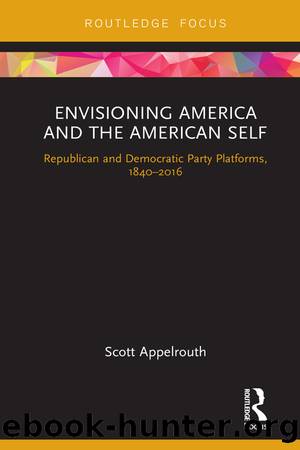Envisioning America and the American Self by Scott Appelrouth

Author:Scott Appelrouth [Appelrouth, Scott]
Language: eng
Format: epub
ISBN: 9780367671808
Barnesnoble:
Publisher: Taylor & Francis
Published: 2020-12-18T00:00:00+00:00
The modern Republican Party: freedom vs. big government
By the end of the mid-century period, the postwar political consensus that submerged inter- and intraparty conflict had ended. The GOPâs identity was now centered on ideological purity and an unwavering dedication to a conservative agenda (Kabaservice 2012; Grossman and Hopkins 2016) that left moderates increasingly marginalized within, if not purged from the party. The intellectual seeds for the GOPâs move to the right were planted during the 1960s, principally through the efforts of William F. Buckley, founder of the National Review, and Frank S. Meyer, a leading contributor. Together they forged a conservative ideology that fused elements of economic libertarianism, anticommunism, and moral traditionalism (Nash 1976). The former contends that individual freedom depends upon limited government and preserving âpristineâ capitalism where prosperity, happiness, and individual self-interest are maximized via a free market exchange of private property and labor. The latter offered conservatives, through its assertion of an absolute moral order grounded in the Protestant values of individual responsibility and self-discipline, a religiously inspired justification for the type of freedom envisioned by this particular brand of libertarianism (Himmelstein 1990).
Federal programs aimed at ameliorating poverty, promoting opportunities for the less advantaged, and protecting workers and the environment that the party supported only a decade ago were now pilloried for generating a culture of dependency and moral weakness or for their wanton âwaste, fraud, and abuse.â Platforms called for eliminating formally championed public agencies â the âDepartments of Commerce, Housing and Urban Development, Education and Energy, ⦠the National Endowment for the Arts, the National Endowment for the Humanities, the Corporation for Public Broadcasting, and the Legal Services Corporationâ (1996) â that were now viewed as infringements on taxpayersâ rights to be left alone, not as commitments to the common good or means for welding a national culture. Instead, the party continued to sharpen its focus on âAmericansâ and their âfamilies,â whose future was best supported through reforming an overbearing government that âimpairs the power of the people to control their destinyâ (1980). Here is the modern-day Republican Party that champions lowering taxes and removing federal regulations in order to curb inflation, promote job creation, spur economic growth, and ârestore the American Dream.â7
At the center of their restoration project, platforms proclaimed that âthe Republican Party believes nothing is more important to our nationâs defense and social well-being than economic growthâ (1980). All problems are economic matters best sorted out through a free market unfettered by government intervention that can only pervert the natural order, whereas power imbalances do not corrode justice and equality but rather spur the competitive exchanger to self-actualization. Unlike the partyâs earliest view and despite its professed allegiance to Christian values, the pursuit of wealth is no longer met with suspicion or corralled by a public morality that enjoins entitlement only to oneâs âfair share.â And poverty, no longer a social injustice in need of public redress, is now a matter of individual choice, a sign of personal moral failing. Concerns for
Download
This site does not store any files on its server. We only index and link to content provided by other sites. Please contact the content providers to delete copyright contents if any and email us, we'll remove relevant links or contents immediately.
The Secret History by Donna Tartt(19088)
The Social Justice Warrior Handbook by Lisa De Pasquale(12190)
Thirteen Reasons Why by Jay Asher(8910)
This Is How You Lose Her by Junot Diaz(6887)
Weapons of Math Destruction by Cathy O'Neil(6280)
Zero to One by Peter Thiel(5802)
Beartown by Fredrik Backman(5754)
The Myth of the Strong Leader by Archie Brown(5507)
The Fire Next Time by James Baldwin(5446)
How Democracies Die by Steven Levitsky & Daniel Ziblatt(5219)
Promise Me, Dad by Joe Biden(5153)
Stone's Rules by Roger Stone(5088)
A Higher Loyalty: Truth, Lies, and Leadership by James Comey(4964)
100 Deadly Skills by Clint Emerson(4925)
Rise and Kill First by Ronen Bergman(4789)
Secrecy World by Jake Bernstein(4753)
The David Icke Guide to the Global Conspiracy (and how to end it) by David Icke(4720)
The Farm by Tom Rob Smith(4513)
The Doomsday Machine by Daniel Ellsberg(4490)
